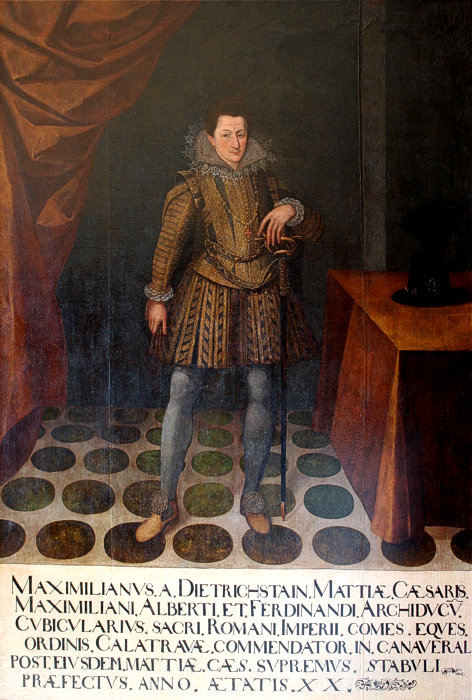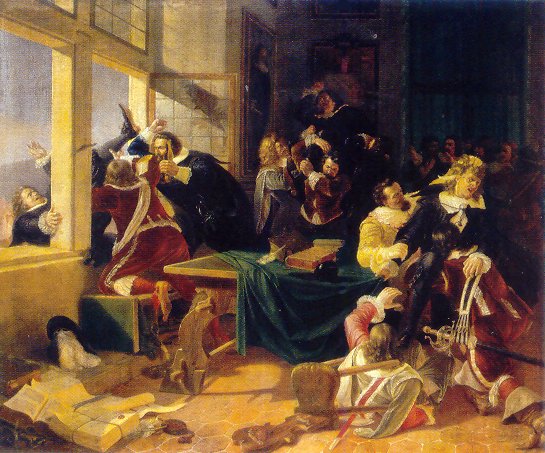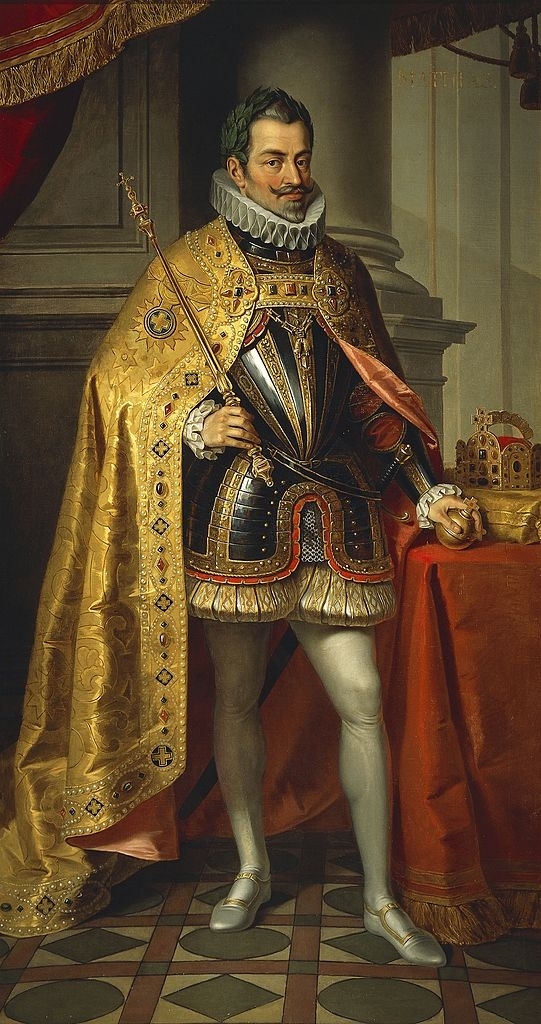|
Maximilian, Prince Of Dietrichstein
Maximilian, Prince of Dietrichstein (27 June 1596 – 6 November 1655), was a German prince member of the House of Dietrichstein, Imperial Count (''Reichsgraf'') of Dietrichstein and owner of the Lordship of Nikolsburg in Moravia; since 1629 2nd Prince (''Fürst'') of Dietrichstein zu Nikolsburg, Baron (''Freiherr'') of Hollenburg, Finkenstein and Thalberg, was a diplomat and minister in the service of the House of Habsburg. He was a ''Kämmerer'', Lord Chamberlain (''Obersthofmeister''), Conference Minister (''Konferenzminister'') and Privy Councillor of Emperors Ferdinand II and Ferdinand III, Knight of the Order of the Golden Fleece since and ruler over Nikolsburg (now Mikulov), Polná, Kanitz (now Dolní Kounice), Leipnik (now Lipník nad Bečvou), Weisskirch and Saar (now Žďár nad Sázavou). Born in Vienna, he was the second but eldest surviving son of Sigismund II, Count of Dietrichstein and Baron of Hollenburg, Finkenstein and Thalberg, by his second wife Johanna vo ... [...More Info...] [...Related Items...] OR: [Wikipedia] [Google] [Baidu] |
Maximilian Of Dietrichstein 1655
Maximilian, Maximillian or Maximiliaan (Maximilien in French) is a male given name. The name " Max" is considered a shortening of "Maximilian" as well as of several other names. List of people Monarchs *Maximilian I, Holy Roman Emperor (1459–1519) *Maximilian II, Holy Roman Emperor (1527–1576) *Maximilian I, Elector of Bavaria (1573–1651) *Maximilian II Emanuel, Elector of Bavaria (1662–1726) *Maximilian III Joseph, Elector of Bavaria (1727–1777) *Maximilian I Joseph of Bavaria (1756–1825) *Maximilian II of Bavaria (1811–1864) *Prince Maximilian of Baden (1867–1929) *Duke Maximilian Joseph in Bavaria (1808–1888) *Maximilian I of Mexico (1832–1867) Other royalty *Maximilian, Hereditary Prince of Saxony (1759–1838) *Maximilian, Margrave of Baden (born 1933) Saints *Maximilian of Antioch (died ), Christian martyr *Maximilian of Lorch (died 288), Christian bishop and martyr *Maximilian of Tebessa (274–295), Christian martyr *Maximilian Kolbe (1894–1941), ... [...More Info...] [...Related Items...] OR: [Wikipedia] [Google] [Baidu] |
Dolní Kounice
Dolní Kounice (; german: Kanitz) is a town in Brno-Country District in the South Moravian Region of the Czech Republic. It has about 2,500 inhabitants. Geography Dolní Kounice is situated about south of Brno in the valley of the Jihlava (river), Jihlava River. It lies in the Bobrava Highlands. History The first written mention of Kounice is from 1183, when a Premonstratensians, Premonstratensian ''Rosa coeli'' convent was built here. It was founded in 1181 and was the oldest convent in Moravia. A church already stood here in 1183. In 1284–1330, a Gothic convent castle was built here. Since the 15th century, the village has been named Dolní Kounice. In 1527, the convent was abolished. An attempt was made to restore it in 1702, but a year later it was destroyed by a fire and never restored again. From 1537, the manor was owned by various noble families. In 1571, Dolní Kounice was promoted to a town and obtained coat of arms. During the rule of the Drnovský of Drnovice fami ... [...More Info...] [...Related Items...] OR: [Wikipedia] [Google] [Baidu] |
Franz Von Dietrichstein
Franz Seraph von Dietrichstein ( cs, František Serafín z Ditrichštejna, 22 August 1570 – 19 September 1636), of the Austrian and Moravian House of Dietrichstein, was Prince of Dietrichstein, Archbishop of Olomouc, Governor (Landeshauptmann) of Moravia and a Cardinal. Early life Dietrichstein was born on 22 August 1570 in Madrid, the 8th of 12 children born to Adam von Dietrichstein, the Holy Roman Empire's then-ambassador to Spain. He studied in Vienna and Prague. Then in 1588, at age 18, he moved to Rome to study at the Collegium Germanicum. While in Rome be befriended Cardinal Ippolito Aldobrandini who was elected pope in 1592 and took the name Pope Clement VIII. Dietrichstein became the new pope's chamberlain and worked to represent the interests of his native Bohemia as canon of the cathedral chapters of Olomouc, Wroclav, Passau and Leitmeritz. [...More Info...] [...Related Items...] OR: [Wikipedia] [Google] [Baidu] |
Defenestrations Of Prague
The Defenestrations of Prague ( cs, Pražská defenestrace, german: Prager Fenstersturz, la, Defenestratio Pragensis) were three incidents in the history of Bohemia in which people were defenestrated (thrown out of a window). Though already existing in Middle French, the word ''defenestrate'' ("out of the window") is believed to have first been used in English in reference to the episodes in Prague in 1618 when the disgruntled Protestant estates threw two royal governors out of a window of the Hradčany Castle and wrote an extensive apologia explaining their action. In the Middle Ages and early modern times, defenestration was not uncommon—the act carried elements of lynching and mob violence in the form of murder committed together. The first governmental defenestration occurred in 1419, second in 1483 and the third in 1618, although the term "Defenestration of Prague" more commonly refers to the third. Often, however, the 1483 event is not recognized as a "significant de ... [...More Info...] [...Related Items...] OR: [Wikipedia] [Google] [Baidu] |
Hans Ulrich Von Eggenberg
Prince Hans Ulrich von Eggenberg (156818 October 1634) was an Austrian statesman, a son of Seyfried von Eggenberg, Lord of Erbersdorf (1526-1594), and great-grandson of Balthasar Eggenberger (died 1493). He was a prominent member of the House of Eggenberg and gained the title of Duke of Krumau. Biography Hans Ulrich von Eggenberg may only have been of simple parentage and had a Protestant upbringing, but by his own means, he succeeded in becoming one of the most influential Catholic princes in the Holy Roman Empire within just a few decades, outshining even his successful cousin, Ruprecht von Eggenberg. His career, however, developed too quickly and too successfully for it to go unnoticed and unenvied. Contemporaries and historians have had differing opinions regarding Eggenberg's character: seeing him as a man ... who is successful at everything he does, a fellow of good fortune, with a reputation of being completely loyal to the Emperor, highly gifted and reliable, but also a ... [...More Info...] [...Related Items...] OR: [Wikipedia] [Google] [Baidu] |
Melchior Klesl
Melchior Khlesl (Klesl,Klesel,CleseliusHe uses the spelling Khlesl himself in his German-language correspondence: Victor Bibl, Klesl's Briefe an K. Rudolfs II. Obersthofmeister Adam Freiherrn von Dietrichstein (1583-1589). Ein Beitrag zur Geschichte Klesl's und der Gegenreformation in Niederösterreich, in: Archiv für österreichische Geschichte 88 (1900) 473-580.) (19 February 1552 – 18 September 1630) was an Austrian statesman and cardinal of the Roman Catholic Church during the time of the Counter-Reformation. Klesl was appointed Bishop of Vienna in 1602 and elevated to cardinal in 1616. Biography Born in Vienna to Lutheran Protestant parents, with his father being a baker, Melchior Klesl studied philosophy at the University of Vienna, and was with his parents converted by the court chaplain, Father Georg Scherer, S.J. He received minor orders in 1577, when he was assigned a canonry, and, even while in minor orders, he preached and held conferences at Korneuburg and in th ... [...More Info...] [...Related Items...] OR: [Wikipedia] [Google] [Baidu] |
Rudolph II, Holy Roman Emperor
Rudolf II (18 July 1552 – 20 January 1612) was Holy Roman Emperor (1576–1612), King of Hungary and Croatia (as Rudolf I, 1572–1608), King of Bohemia (1575–1608/1611) and Archduke of Austria (1576–1608). He was a member of the House of Habsburg. Rudolf's legacy has traditionally been viewed in three ways:Hotson, 1999. an ineffectual ruler whose mistakes led directly to the Thirty Years' War; a great and influential patron of Northern Mannerist art; and an intellectual devotee of occult arts and learning which helped seed what would be called the Scientific Revolution. Determined to unify Christendom, he initiated the Long Turkish War (1593–1606) with the Ottoman Empire. Exhausted by war, his citizens in Hungary revolted in the Bocskai Uprising, which led to more authority given to his brother Matthias. Under his reign, there was a policy of toleration towards Judaism. Early life Rudolf was born in Vienna on 18 July 1552. He was the eldest son and successor of ... [...More Info...] [...Related Items...] OR: [Wikipedia] [Google] [Baidu] |
Matthias, Holy Roman Emperor
Matthias (24 February 1557 – 20 March 1619) was Holy Roman Emperor from 1612 to 1619, Archduke of Austria from 1608 to 1619, King of Hungary and Croatia from 1608 to 1618, and King of Bohemia from 1611 to 1617. His personal motto was ''Concordia lumine maior'' ("Unity is stronger than light"). Matthias played a significant role in the familial opposition of the Habsburgs against his brother Emperor Rudolf II. After gaining power, he showed little political initiative of his own. The course of his politics was determined by Cardinal Klesl until his fall in 1618. As a consequence of his failed religious and administrative policies the Bohemian Revolt, the initial theatre of the Thirty Years War set off during the final year of his reign. Biography Family Matthias was born in the Austrian capital of Vienna as the fourth son of Maximilian II, Holy Roman Emperor, and Maria of Spain. His brothers were Rudolf (who became Emperor Rudolf II), Ernest, Maximilian (from 1585 Grand Mast ... [...More Info...] [...Related Items...] OR: [Wikipedia] [Google] [Baidu] |
Verona
Verona ( , ; vec, Verona or ) is a city on the Adige River in Veneto, Northern Italy, Italy, with 258,031 inhabitants. It is one of the seven provincial capitals of the region. It is the largest city Comune, municipality in the region and the second largest in northeastern Italy. The metropolitan area of Verona covers an area of and has a population of 714,310 inhabitants. It is one of the main tourist destinations in northern Italy because of its artistic heritage and several annual fairs and shows as well as the Opera, opera season in the Verona Arena, Arena, an ancient Ancient Rome, Roman Amphitheatre, amphitheater. Between the 13th and 14th century the city was ruled by the Scaliger, della Scala Family. Under the rule of the family, in particular of Cangrande I della Scala, the city experienced great prosperity, becoming rich and powerful and being surrounded by new walls. The Della Scala era is survived in numerous monuments around Verona. Two of William Shakespeare's ... [...More Info...] [...Related Items...] OR: [Wikipedia] [Google] [Baidu] |
Scaliger
The Della Scala family, whose members were known as Scaligeri () or Scaligers (; from the Latinized ''de Scalis''), was the ruling family of Verona and mainland Veneto (except for Venice) from 1262 to 1387, for a total of 125 years. History When Ezzelino III was elected ''podestà'' of the commune in 1226, he was able to convert the office into a permanent lordship. Upon his death the Great Council elected as podestà Mastino I della Scala, Mastino I, who succeeded in converting the ''signoria'' (seigniory) into a family inheritance, governing at first with the acquiescence of the commune, then, when they failed to re-elect him in 1262, he effected a coup d'état and was acclaimed ("people's captain"), at the head of the commune's troops. In 1277 Mastino was killed by a faction of the nobles. The reign of his son Alberto I della Scala, Alberto as ''capitano'' (1277–1302) was an incessant war against the counts of San Bonifacio, who were aided by the House of Este. Of his thre ... [...More Info...] [...Related Items...] OR: [Wikipedia] [Google] [Baidu] |
Amerang
Amerang is a Municipalities in Germany, municipality and a village in the Rosenheim (district), Rosenheim district in Bavaria, Germany. It is located south of Wasserburg am Inn. It is known for its historical car museum ''EFA-Museum für Deutsche Automobilgeschichte'', an open air farmhouse museum and concerts in the Amerang Castle. See also *Grub (Amerang) *Kirchensur References Rosenheim (district) Villages in Bavaria {{Rosenheimdistrict-geo-stub ... [...More Info...] [...Related Items...] OR: [Wikipedia] [Google] [Baidu] |
Sigismund II, Count Of Dietrichstein
Sigismund (variants: Sigmund, Siegmund) is a German proper name, meaning "protection through victory", from Old High German ''sigu'' "victory" + ''munt'' "hand, protection". Tacitus latinises it ''Segimundus''. There appears to be an older form of the High German word "Sieg" (victory): ''sigis'', obviously Gothic and an inferred Germanic form, and there is a younger form: ''sigi'', which is Old Saxon or Old High German ''sigu'' (both from about 9th century). A 5th century Prince of Burgundy was known both as ''Sigismund'' and ''Sigimund'' (see Ernst Förstemann, ''Altdeutsche Personennamen'', 1906; Henning Kaufmann, ''Altdeutsche Personennamen'', Ergänzungsband, 1968). Its Hungarian equivalent is Zsigmond. A Lithuanian name Žygimantas, meaning "wealth of (military) campaign", from Lithuanian ''žygis'' "campaign, march" + ''manta'' "goods, wealth" has been a substitution of the name ''Sigismund'' in the Lithuanian language, from which it was adopted by the Ruthenian language as ... [...More Info...] [...Related Items...] OR: [Wikipedia] [Google] [Baidu] |





